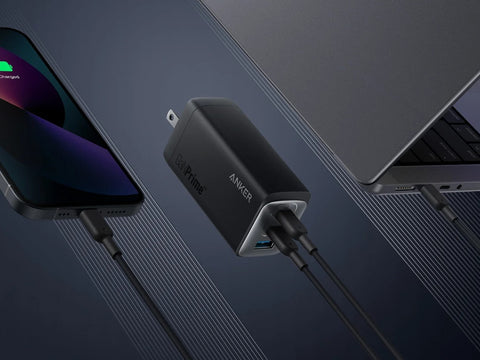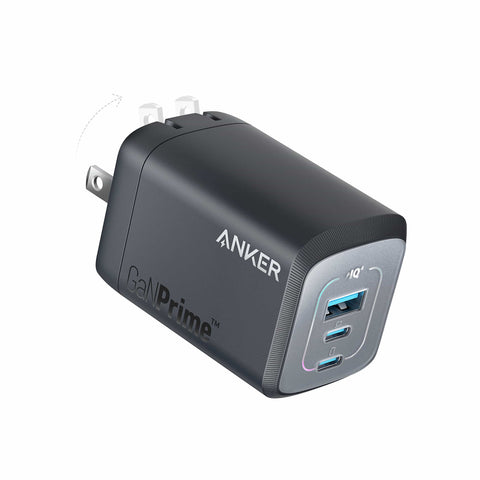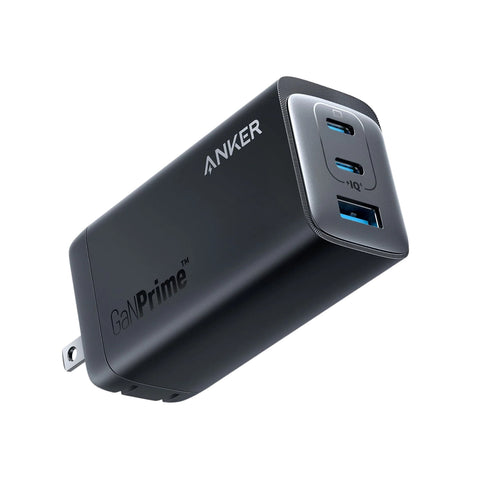
Powering Up: Can a USB-C Phone Charger Charge a Laptop?
As technology advances, whether can a USB-C phone charger charge a laptop has become increasingly relevant for those seeking convenience and compatibility across devices. In this article, we'll explore the critical differences between phone and laptop USB-C chargers, the factors to consider when attempting to charge a laptop with a USB-C phone charger, and essential safety tips to keep in mind for a seamless charging experience. Let's get started!

Differences Between Phone and Laptop USB-C Chargers
USB-C has become an increasingly common standard for charging and data transfer among devices, including phones and laptops. However, there are some fundamental differences between phone and laptop USB-C chargers.
Power Supply: Laptop chargers usually provide higher power output because laptops require more energy to operate. A typical laptop USB-C charger can deliver power up to 60W, 90W, or even 100W. On the other hand, phone chargers are generally lower powered, usually delivering around 18W to 25W of power.
Size and Design: Laptop chargers tend to be bulkier due to their higher power capacity. They frequently come with a separate power brick and detachable cables. Phone chargers, in contrast, are compact and portable, typically designed as a single unit that plugs directly into a wall socket.
On-Device Charging Technology: Can I use USB-C phone charger for laptop? Well, even if the power rating of a phone's charger matches that of a laptop's, the laptop likely cannot utilize the full power capacity due to the device's built-in charging technology. Phones have different charging standards, like Qualcomm's Quick Charge or Apple's Fast Charging, which define their maximum charging capacity.
What to consider when charging a laptop with a USB-C phone charger?
Here are key factors to consider when charging a laptop with a USB-C phone charger.
Charger Wattage
Your phone charger's wattage significantly impacts your laptop's charging speed and functionality. Typically, phone chargers have a lower wattage compared to laptop chargers. If the wattage is too low, your laptop may not charge at all, or it may charge at a significantly slower rate than with the original charger. Charging while using the laptop may also be challenging in such cases. Ensure you choose a USB-C phone charger with adequate wattage to satisfy your laptop's requirements. To determine the wattage of a charger, simply multiply the voltage (V) by the amperage (A).
USB-C Compatibility
Not all USB-C cables and chargers are created equal, and they can really vary in terms of charging speed and data transfer capabilities. Ideally, you should use a USB-C cable and charger that is compliant with the USB Power Delivery (USB-PD) standard, which ensures efficient and high-power charging of supported devices. Ensure that the cable and charger you select meets the USB-PD specifications required for your laptop.
Device Compatibility
Not all laptops come with a USB-C charging port, and even if your laptop has a USB-C port, it may not support charging through that port. Refer to the user manual and/or product specifications of your laptop to verify if USB-C charging is supported. Besides, laptops typically have specific power requirements that need to be met to charge safely and efficiently. It's crucial to verify that your phone charger matches these requirements to prevent any damage to the device or reduce charging efficiency.
Power Requirements
Your laptop's power requirements, such as voltage and current input, must be considered when using a USB-C phone charger. Charging your laptop with a charger that does not meet the required voltage and current input can result in poor performance, a slow charging rate, or potential damage. Check your laptop's user manual or the label on the original charger to determine the required voltage and amperage and ensure that the phone charger you intend to use can deliver the necessary power output.
Safety Tips for Charging Your Laptop with a USB-C Charger
Match Power Requirements: Ensure that the charger's output voltage and current match your laptop's power requirements. This is essential for maintaining the performance and safety of your device.
Inspect the Charger and Cable: Regularly check the condition of the charger and cable and look for any signs of wear or damage. A frayed cable or a damaged charger can pose a safety hazard.
Unplug When Not in Use: Remember to unplug the charger from the power outlet when not in use as a precautionary measure; charger faults and power surges can potentially cause damage to your device.
Monitor Charging: Keep an eye on your laptop while charging with a USB-C phone charger. Unplug the charger immediately if you notice any unusual behavior, like excessive heat.
Use High-Quality Chargers and Cables: Always use a reputable, high-quality USB-C charger and cable to ensure safe and efficient charging. It's worth investing in a charger from a well-known brand that adheres to strict safety standards.
When it comes to top-tier USB-C chargers, we at Anker pride ourselves on delivering unparalleled quality tailored just for you! Dive into our offerings and discover the best charging solutions on the market.
Speaking of high-quality USB-C chargers, Anker is a reputable brand that has a lot to offer just for you! Check these out:
Anker Prime 100W GaN Wall Charger (3 Ports)
Experience the convenience of charging three devices at once with our Anker Prime 100W GaN Wall Charger (3 Ports). Equipped with 2 USB-C and 1 USB-A ports, this charger delivers a powerful 100W max output, whether you're using both USB-C ports or pairing one with the USB-A port. Despite its robust capabilities, we've designed it to be 43% more compact than the original 96W MacBook charger. Beyond performance, we've integrated ActiveShield™ 2.0 to ensure a safe charging experience every time.

Anker 737 Charger (GaNPrime 120W)
The Anker 737 Charger (GaNPrime 120W) boosts efficiency with its capacity to power three devices simultaneously via two USB-C ports and one USB-A port, offering up to 100W per device. Our advanced PowerIQ 4.0 technology ensures dynamic power distribution for quicker charging sessions. Safety remains our priority, and that's why we've incorporated ActiveShield 2.0 technology to consistently monitor and regulate temperature. One of the defining features of this charger is its GaNPrime™ component, promoting energy conservation. Through its use, we can potentially conserve up to 796.39 million kWh every year. To put that into perspective, it's akin to powering the entire state of Hawaii for a month.

Conclusion
In addressing the query, "can a usb c phone charger charge a laptop?", the short answer is yes, due to the universality of the USB-C port. However, significant differences exist between phone and laptop USB-C chargers, including wattage and compatibility. Using a phone charger for a laptop might work temporarily, but it's essential to consider potential inefficiencies and risks. While technically possible, it's crucial to ensure it's suitable for your specific device. Always consult your device's guidelines or seek expert input.
FAQ
Here are some commonly asked questions regarding "Can a USB-C phone charger charge a laptop?".
Are all USB-C chargers the same voltage?
No, all USB-C chargers are not the same voltage. USB-C chargers come in different power ratings, usually ranging between 5V to 20V. The power output of a USB-C charger depends on the device it's designed to charge. Therefore, it's crucial to check the voltage rating of your charger.
How do I know if my phone charger is compatible with my laptop?
To determine if your phone charger is compatible with your laptop, first, check the power output (wattage) and voltage of your phone charger, which is often labeled or written on it. Then, compare these specifications with the power input requirements of your laptop, which can be found in the manual or on the laptop's power supply. If the charger provides the necessary voltage and equal or greater current, it should be compatible.
Will using a phone charger to charge my laptop damage the laptop?
Generally, using a phone charger to charge your laptop won't damage it, but it might not provide efficient charging. Most phone chargers are lower wattage and might not supply enough power to adequately charge a laptop, resulting in slow or no charging. However, it's important to ensure that the charger you're using supports the same voltage as your laptop to reduce the risk of any potential damage.















